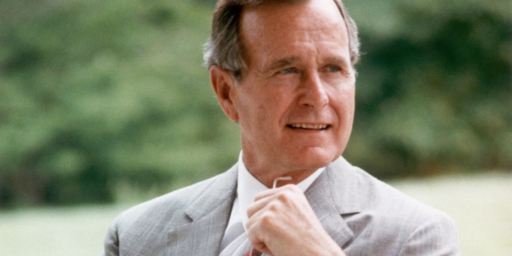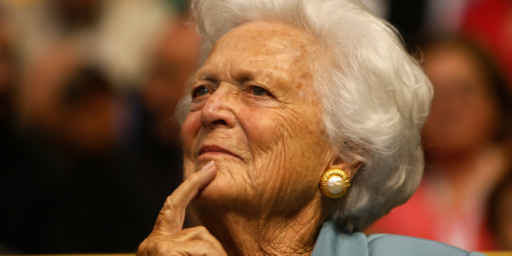Politics and the Personal
Matthew Yglesias, linking a touching story about President Bush’s reaction to a little girl who lost her mom on 9/11, observes,
This is a sweet story, but you’ve really got to wonder if the president plans on following this up by giving comforting hugs to all the kids out there who’ve lost a parent to the second Gulf War. But I don’t mean to suggest that the president’s empathy is insincere. Rather, it demonstrates the extent of the reality gap faced by Bush. When concrete individual intrude personally into his life, he behaves toward them in a very reasonable, very ethical manner. When he makes decisions that, in somewhat complicated, abstract, and sometimes indirect ways that have enormous impact on the lives of huge numbers of people all around the world, it’s a different story.
That’s the essence of command. Anyone–whether a president, a squad leader, or a fire chief–who orders people into harm’s way has to have the ability to simultaneously comprehend the deeply personal consequences of his orders–real people will die, become permanently maimed, or never see their loved ones again–and yet put that aside when making decisions.
Eisenhower, Roosevelt, and Churchill knew that tens of thousands would die when they launched the Normandy invasion; surely, that idea sickened them.
I can’t imagine Harry Truman wasn’t extremely anguished over whether to drop the atomic bombs on Hiroshima and Nagasaki. But he claims to have never lost a night of sleep over it once he gave the order. A man who wallows in the details is almost certainly unable to make critical decisions. Leadership requires being able to get past the horrific consequences of action when inaction would have more severe consequences.*
Even at a less grand level, the ability to depersonalize the abstract while personalizing the concrete is required to function in everyday life. One can, for example, simultaneously think the advantages of the automobile outweigh the thousands of highway fatalities every year and yet feel real emotion when someone close to you is touched by this tragedy.
Update: Matt responds here. My response to his response to my response is in the comment section there.
Update: Andrew Sullivan thinks this story explains “Why Bush is still popular.”
*Whether the Iraq War qualifies on this front is, of course, an open question. But Bush clearly believes the cause is worth the cost. Once that decision is reached, one must act accordingly.






Yglesias really can be tiring. If that were Clinton “feeling her pain” we would be all hearts and flowers talking about how wonderful he was.
Unlike the mountains of staged photo-ops during the Clinton administration this was a genuine moment the likes of which Clinton was probably incapable.
It is things like this, that make people like Yglesias who back John Kerry shudder.
Me thinks he protests too much.
Paul, I agree that Matt is far from objective in his analysis. But I have to say, at least a part of your response is far from objective.
You clearly dislike Clinton (as do I), but your opinion has clouded your judgment. Clinton would have been just as good at this moment as Bush was. He always did that sort of thing very well.
[snark] It’s just that he wouldn’t have been sincere. Or maybe he would have tried to cop a feel.[/snark]
Well Guys , I know that many people hate Clinton for so many reasons, but let me tell you he was not all that bad also !